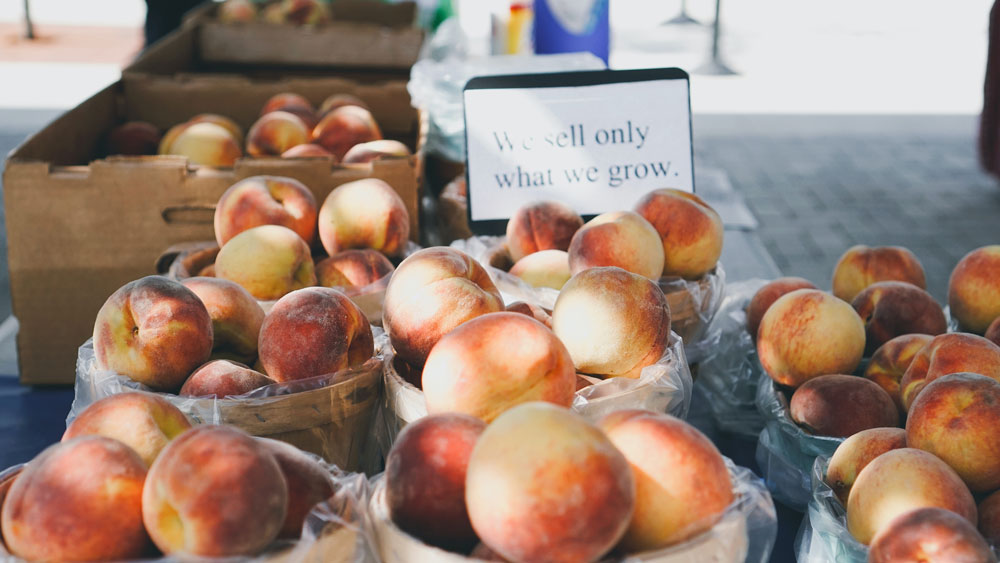Healthy Life, Healthy Planet: 7 Ways You Can Live Sustainably
(Updated April 2023)
April 22, 2021

Every year on Earth Day, people across the planet show support for the environment. Living an Earth-friendly lifestyle means thinking about the effect your choices make on food, products and energy use. Small changes in your daily routine can cut pollution and waste all year.
Those changes can help your health, too. Studies show an unhealthy environment can worsen some health issues, such as asthma, chronic obstructive pulmonary disease, heart disease and stroke.
This Earth Day, don’t just plant a tree. Try to make healthy choices that are good for the planet, too.

1. Make healthy food choices.
Scientists are looking at the effect of the human diet on the environment. Studies suggest a healthy diet equals a healthy planet. Fruits, vegetables, beans and whole grains are best for protecting climate and water resources. These foods are healthy for you, too.
2. Eat less meat.
The meat you eat has a carbon footprint. That’s the total amount of greenhouse gases, like carbon dioxide and methane, our actions create. These gases are released in food processing, packaging, transportation, retail trade and food services.
You don’t have to give up meat to help the environment. Limiting the amount of meat you eat, especially beef and pork, can have a big impact.
Researchers have found if every American ate a meatless meal twice per week, it would reduce emissions by as much as 90 million tons. This equals the amount of greenhouse gas emissions each year in Sweden and Norway combined.
Eating less meat is good for the environment and your health. Find healthy recipe ideas on the American Diabetes Association's Food Hub.
Photo by Laure Noverraz on Unsplash.
3. Exercise outside.
Take your treadmill run outside. Or skip the spin class and opt for a bike ride instead. You can use the time to take in the fresh air and sunshine, all while using less energy.
Other benefits to exercising outside? It won’t cost you anything and will likely give you a mood boost. Studies show fresh air and sunshine improve mental health.
4. Take alternative transportation.
Pollution from vehicles can lead to health problems. These include things like early death, heart issues, worsening of asthma symptoms and diminished lung function, according to the Centers for Disease Control and Prevention (CDC).
Almost half of the trips people take in their cars are less than 4 miles from home, according to the National Household Travel Survey. Consider walking or taking a bike to get where you need to go. Leaving the car at home will save gas, help the environment and boost your physical activity.
If you’re looking to get from one part of the city to another, hop on a Blue Bike. That’s the short-term bike rental program in the city. In 2020, people rode nearly 17,000 miles on Blue Bikes and saved 880 gallons of gas.

5. Visit a farmers market.
On average, food in the U.S. travels about 1,500 miles to get to your plate. Getting food from farm to table uses a lot of natural resources. Packaging it for travel creates pollution and waste.
Shopping at a farmers market helps your local farmer and puts fresh, whole foods in your kitchen. It is good for the Earth since the food doesn’t have to travel far.
Local farmers typically use farming methods that do less damage to the environment than those used by large-scale operations. Find a local market near you on the South Carolina Department of Agriculture’s website.
6. Shop seasonally.
Did you know a typical American dinner contains ingredients from, on average, five other countries? Buying local fruits and vegetables in season is better for the environment. The food travels shorter distances to get to you and doesn’t require harmful farming practices to grow.
Eating foods in season helps you connect with the Earth. Enjoy fresh strawberries in the spring, peaches in the summer, pumpkins in the fall and collards in the winter. Find more seasonal produce on the Certified South Carolina® website.
7. Start composting.
The Environmental Protection Agency (EPA) says food scraps and yard waste make up about 30 percent of our trash. One way to cut down on food waste is to put it to work in your garden by starting a compost bin.
Compost is organic material added to soil to help plants grow. Starting a compost bin at home will keep trash out of the landfill, where it can create greenhouse gas emissions. It can help you grow your own healthy fruits, veggies or flowers. Find tips for getting started on the EPA website.
This article contains links to third party sites. Those organizations are solely responsible for their contents and the privacy policies on their sites.
The Centers for Disease Control and Prevention, the Environmental Protection Agency and the National Household Travel Survey are independent organizations that offer health information you may find helpful.
Shopping locally and in season at local farmers markets is good for the environment and the community.
Photo by Brad Stallcup on Unsplash.
Related Reading:
 How To Control Your Stress
How To Control Your Stress
The last year has been a stressful one whether due to the pandemic, economic worries or social unrest. For Stress Awareness Month, we asked a BlueCross case manager for some tips and insight into managing stress.
Read More 5 Things To Add To Your South Carolina 2021 Bucket List
5 Things To Add To Your South Carolina 2021 Bucket List
Milo Anderson, an Experience Columbia ambassador and creator of Milo's Wildlife, an online guide for wild travels, knows how to explore his own backyard. As you make your New Year’s resolutions or 2021 bucket list, here are few of his favorite places in the state to add to your list.
Read More Treat Yo Self Every Day
Treat Yo Self Every Day
A television show may have brought the idea of “Treat Yo Self” to the mainstream, but taking care of yourself should be on your to-do list every day. A BlueCross health coach offers some ideas for how to get started taking care of yourself every day.
Read More



















